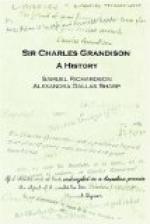She is coming! She is coming! interrupted he. We are all in pieces: we were in the midst of a feud, when you arrived. If she is not civil to you—
In swam the lady; her complexion raised; displeasure in her looks to me, and indignation in her air to Sir Harry; as if they had not had their contention out, and she was ready to renew it.
With as obliging an air as I could assume, I paid my compliments to her. She received them with great stiffness; swelling at Sir Harry: who sidled to the door, in a moody and sullen manner, and then slipt out.
You are Sir Charles Grandison, I suppose, sir, said she; I never saw you before: I have heard much talk of you.—But, pray, sir, are good men always officious men? Cannot they perform the obligations of friendship, without discomposing families?
You see me now, madam, in an evil moment, if you are displeased with me: but I am not used to the displeasure of ladies: I do my utmost not to deserve it; and, let me tell you, madam, that I will not suffer you to be displeased with me.
I took her half-reluctant hand, and led her to a chair, and seated myself in another near her.
I see, sir, you have your arts.
She took the fire-screen, that hung by the side of the chimney, and held it before her face, now glancing at me, now turning away her eye, as if resolved to be displeased.
You come upon a hateful errand, sir: I have been unhappy ever since your officious letter came.
I am sorry for it, madam. While you are warm with the remembrance of a past misunderstanding, I will not offer to reason with you: but let me, madam, see less discomposure in your looks. I want to take my impressions of you from more placid features: I am a painter, madam: I love to draw lady’s pictures. Will you have this pass for a first sitting?
She knew not what to do with her anger: she was loath to part with it.
You are impertinent, Sir Charles—Excuse me—You are impertinent.
I do excuse you, Lady Beauchamp: and the rather, as I am sure you do not think me so. Your freedom is a mark of your favour; and I thank you for it.
You treat me as a child, sir—
I treat all angry people as children: I love to humour them. Indeed, Lady Beauchamp, you must not be angry with me. Can I be mistaken? Don’t I see in your aspect the woman of sense and reason?—I never blame a lady for her humoursomeness, so much as, in my mind, I blame her mother.
Sir! said she. I smiled. She bit her lip, to avoid returning a smile.
Her character, my dear friend, is not, you know, that of an ill-tempered woman, though haughty, and a lover of power.
I have heard much of you, Sir Charles Grandison: but I am quite mistaken in you: I expected to see a grave formal young man, his prim mouth set in plaits: But you are a joker; and a free man; a very free man, I do assure you.




